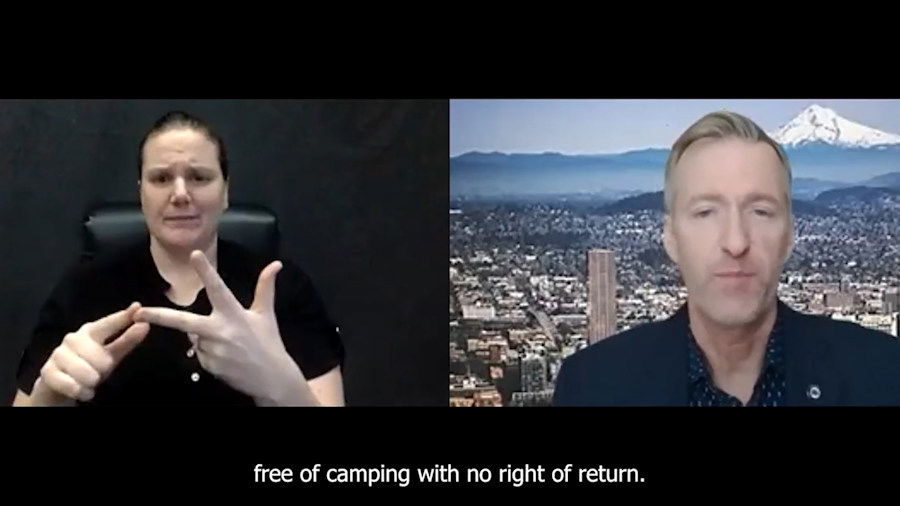Portland mayor bans people from camping near busy roads

PORTLAND, Ore. (AP) — Portland Mayor Ted Wheeler is prohibiting people from camping along freeways and corridors with high crash rates in what he said is the first of several executive actions he will take to address a homelessness crisis made worse by the pandemic.
Wheeler issued an emergency order effective Friday afternoon that tasked the city’s urban camping team with stopping people from setting up tents near busy roadways, Oregon Public Broadcasting reported.
The order comes after a report by the Portland Bureau of Transportation that found 70% of pedestrians killed by cars in 2021 were homeless. While Wheeler framed the move as a humane follow-up to the jarring statistics, critics accused Wheeler of using the information as political cover for a harmful camping crackdown.
Wheeler acknowledged the proposal was in the works before the report’s release, but said it underscored the need to act fast.
“We have continuously witnessed unsanctioned camping in clearly unsafe locations, sometimes jarringly close to roads and freeways,” Wheeler said at a news conference Friday. “You don’t need to be a traffic engineer to sense that that’s not safe.”
Portland Commissioner Jo Ann Hardesty, who oversees the city’s transportation bureau, said she wasn’t consulted on the ordinance. Wheeler’s chief-of-staff, Bobby Lee, said commissioners’ offices were given the order on Thursday.
Homeless and transportation advocates contend the mayor’s action will do little aside from moving vulnerable people around the city without giving them an alternative place to go. Twenty-five advocacy organizations penned a joint-rebuttal Friday to Wheeler’s plan, saying the mayor was ignoring the more significant factors causing deaths, such as poor road design and deferred maintenance.
The mayor’s office said the order will impact campers on 30 roadways owned by both the Oregon Department of Transportation and the city.
The mayor acknowledged Friday it is far from clear where these campers are supposed to go. The county has capacity to shelter roughly 1,400 to 1,500 people year round. There were about 4,000 people experiencing homelessness in Multnomah County in 2019.
Under a 2018 federal court decision known as Martin v. Boise, Idaho, cities are barred from prohibiting camping unless there is available shelter space. Wheeler did not directly answer questions from reporters Friday about how his executive order meshed with the federal court’s ruling. He said city leaders would do their “level best” to give people alternative places to shelter.
Wheeler partly blamed the lack of shelter beds on the state and said he’d made a pitch to Oregon Gov. Kate Brown earlier Friday for help adding 1,000 temporary shelter beds.
Charles Boyle, a spokesperson for the governor, responded that Brown was “focused on working with local partners” and had called for a $400 million investment in affordable housing in Thursday’s State of the State.
“Our office has communicated to the City that they should engage in the legislative process for additional budget asks,” Boyle wrote.
Commissioner Carmen Rubio released a cautious written statement Friday regarding the mayor’s proposal.
“The traffic fatality data is clear and alarming, and it requires a response. Over the coming days, as we learn more about how this will work from the mayor’s office, I intend to make sure that our efforts to reduce traffic fatalities also treat people with dignity and respect,” she wrote. “These actions will naturally disrupt the lives of our houseless neighbors, and we cannot lose sight of those human impacts.”